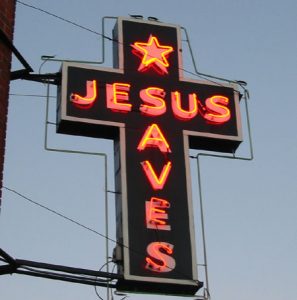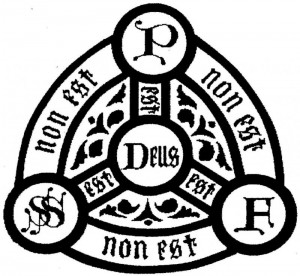 Our kids this week have been “Shipwrecked,” but they’ve also been “rescued by Jesus.”[1] They’ve been learning the truth of that promise emblazoned on neon crosses at innumerable inner-city rescue missions in nearly every English-speaking country in the world, “Jesus saves,” through the metaphor of being lost at sea and washed up on a deserted island. That’s something that happened to St. Paul at least three if not four times![2]
Our kids this week have been “Shipwrecked,” but they’ve also been “rescued by Jesus.”[1] They’ve been learning the truth of that promise emblazoned on neon crosses at innumerable inner-city rescue missions in nearly every English-speaking country in the world, “Jesus saves,” through the metaphor of being lost at sea and washed up on a deserted island. That’s something that happened to St. Paul at least three if not four times![2]
But, unfortunately, St. Paul’s experiences at sea are not in the lectionary this week. Our readings from the bible have nothing to do with ships or the ocean or being lost or getting rescued and aren’t really easy to tie to what the kids have been doing with all these shipwreck decorations in the church. Instead of shipwrecks, the readings this week give us trees. Ezekiel reminds us of one of God’s metaphors for Israel, the noble cedar planted on a mountaintop spreading its branches to provide homes for the birds and winged creatures of every kind (which represent all the nations of the world), producing mighty boughs and the plenteous fruit of righteousness and justice.[3]
 For recreational reading these days, I’m into a novel entitled Winter of the Gods.
For recreational reading these days, I’m into a novel entitled Winter of the Gods. The theme for today’s lessons is clear . . . we are almost “hit upside head” with the concept of Sabbath. Our reading from Deuteronomy is the law establishing the mandatory day of rest:
The theme for today’s lessons is clear . . . we are almost “hit upside head” with the concept of Sabbath. Our reading from Deuteronomy is the law establishing the mandatory day of rest: Some of you may have heard of Brooks’s law, which has to do with the time it takes to complete a software project. It’s similar to the general law of diminishing returns in economics. Professor Fred Brooks of the University of North Carolina first proposed the law in 1975; it holds that “adding manpower to a late software project makes it later.”
Some of you may have heard of Brooks’s law, which has to do with the time it takes to complete a software project. It’s similar to the general law of diminishing returns in economics. Professor Fred Brooks of the University of North Carolina first proposed the law in 1975; it holds that “adding manpower to a late software project makes it later.”

